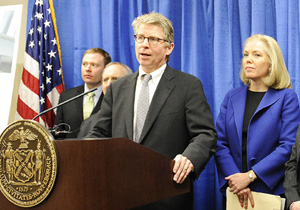As we reported yesterday, we put in a message with the office of Manhattan District Attorney Cy Vance regarding the death of Victor Felix, the 57-year-old pedestrian struck in Harlem Sunday night by alleged drunk driver Garry Kinlock.

Since we learned that the assistant district attorneys who comprise Vance's vehicular crimes unit don't always attend fatal crash scenes, we asked if his office is investigating this case. We also asked if charges against Kinlock might be upgraded from DWI, given that the victim was killed.
To their credit, Vance's press staff replied quickly. Unfortunately, they answered neither of our questions.
"We can’t comment on charges prior to a defendant’s arraignment," wrote a Vance spokesperson, who encouraged us to check in later.
Note that this response ignores the question of whether Vance's office is investigating the death of a Manhattan pedestrian at the hands of an accused drunk driver. As for checking in later, if there is an optimal moment to follow up with the Vance team on vehicular crime cases, in two years Streetsblog has yet to find the sweet spot. With a few exceptions, the pattern goes like so: "No comment" prior to arraignment, then "No comment" on pending cases. Regardless of outcome, once it runs its course the final word on how or why a vehicular case is prosecuted, or not, is normally something along the lines of "We bring the top charge supported by the evidence." Period.
By contrast, a perusal of the Manhattan DA web site finds that Vance and staff have much to say about cases they want to talk about. Press releases are searchable based on the stage of the case, from indictment through appeal. A search for statements pertaining to vehicular crimes yields two results, both announcing convictions.
There is no doubt that a certain amount of discretion is required for law enforcers to do their jobs. The trick is to mind the line between discretion and stonewalling. To martial support for beefing up vehicular crimes statutes so that drivers who injure and kill are held accountable, it is crucial that the public understand, as best as can be explained, how these cases are made and where existing law falls short. Candidate Vance, in so many words, pledged to bridge that gap.
There is also the issue of prioritizing cases -- and, therefore, victims -- depending on how they died. In 2009, a few months before Vance was elected, Aaron Naparstek, then Streetsblog editor-in-chief, wrote:
When a construction crane falls or a New York Giants wide receiver accidentally discharges his gun, New York City's law enforcement community flies into a frenzy of justice-seeking. But when the killing is done by a sober, licensed driver, you can pretty much hear crickets chirping at the District Attorney's office.
The deaths of Yolanda Casal and Laurence Renard showed that, under Vance, even unlicensed drivers can expect to escape charges for killing. Presumably, an alleged drunk driver would have no chance of getting a similar break. But apparently we'll have to wait and see.





